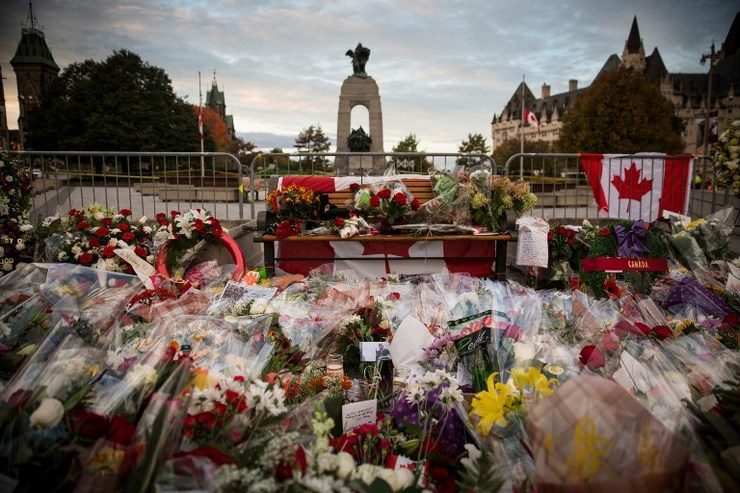SUMMARY
This is AI generated summarization, which may have errors. For context, always refer to the full article.

OTTAWA, Canada – Two young Canadian men who launched deadly attacks in their own homeland were extremists tempted by war in Syria but police have found no evidence of a wider plot, officials said Thursday, October 23.
Canadian authorities are scrambling to probe the background of the young men, one of whom ran his car over a soldier, killing him, and another who on Wednesday, October 22, shot a soldier and stormed parliament.
“These are difficult threats to detect,” Royal Canadian Mounted Police Commissioner Bob Paulson said. “There is no way of knowing where or when such an attack could take place.”
In the House of Commons, members applauded Sergeant-at-Arms Kevin Vickers, who on Wednesday fired the shot that halted the attacker, identified as 32-year-old Michael Zehaf-Bibeau.
Vickers’ composed bravery has become an inspiration to Canadians struggling to comprehend how two of their countrymen could turn against their homeland with such reckless brutality.
“The objective of these attacks was to instill fear and panic in our country and to interrupt the business of government,” Prime Minister Stephen Harper told the chamber as business resumed.
“Well, members, as I said yesterday, Canadians will not be intimidated. We will be vigilant but we will not run scared.”
“We will be prudent but we will not panic and as for the business of government, well, here we are, in our seats, in our chamber in the very heart of our democracy and our work.”
Harper then crossed the floor to shake Vickers’ hand, and to hug opposition leaders.
Shooter ‘acted alone’
On Wednesday, Zehaf-Bibeau, a petty criminal from Montreal, shot dead an unarmed soldier at the Ottawa war memorial before storming the corridors of parliament.
There, officers opened fire, including Vickers, a veteran of the Royal Canadian Mountain Police appointed to lead the parliamentary security team and wield the ceremonial mace.
The attack followed a similar one on Monday, October 20, when 25-year-old Martin Couture-Rouleau ran over two soldiers in a Quebec parking lot, killing one of them, before being shot dead by police.
Both assailants had sought to travel to Syria where they might join Islamist extremists waging war abroad, officials have said.
It remains unclear whether Zehaf-Bibeau “received any support in the planning of his attack,” Paulson said, however insisting that he “acted alone.”
But investigators have so far not uncovered any connection between the two attacks.
“Our investigation has not revealed any link between Zehaf-Bibeau and Martin Couture-Rouleau,” Paulson told reporters.
Canada has never before been hit by Islamist violence, but it has been threatened in militant broadcasts over its role in the US-led air armada striking the Islamic State group in Iraq.
Some Canadians are thought to have travelled to the Middle East to join the group, and others are thought to have developed radical ideas at home, living among Canada’s Muslim minority.
Paying respects
The prospect of more such attacks was at the forefront on many minds on Thursday, as a society proud of its reputation for openness and tolerance grapples with a new menace.
Earlier, Harper placed a bouquet of flowers at the war memorial in the Canadian capital to honor the dead soldier, Corporal Nathan Cirillo.
A large crowd had gathered at the site, still cordoned off with yellow police ribbon, to pay their respects and show their defiance in the face of the unexpected threat from within Canadian society.
Canada’s Muslim community is nervous that the attacks will stir animosity against it, and its leaders were quick to denounce the violence and vow to keep a closer eye on troubled believers.
Imam Sikander Hasni of the Kanata association, who works at the capital’s mosque, said he and his colleagues had worked closely with police and had tipped them off to an earlier plot.
“Something needs to be done but at the same time, I think there’s a realization that sometimes there is not very much that can be done,” he said.
“So we see cases of families with children and teens and young adults who are suffering from mental illnesses or who are falling towards crime and there’s this feeling of helplessness.”
For his part, Harper said the government’s resolve would be redoubled. – Rappler.com
Add a comment
How does this make you feel?
There are no comments yet. Add your comment to start the conversation.